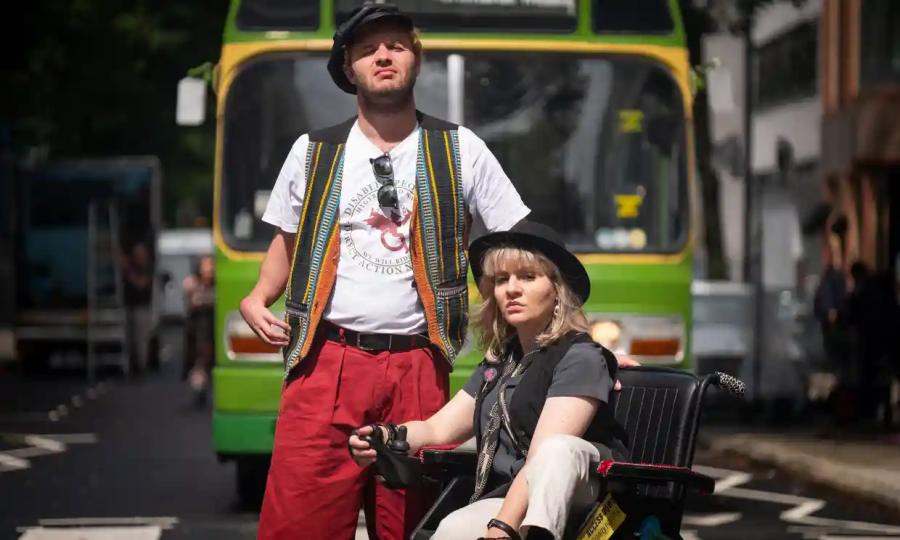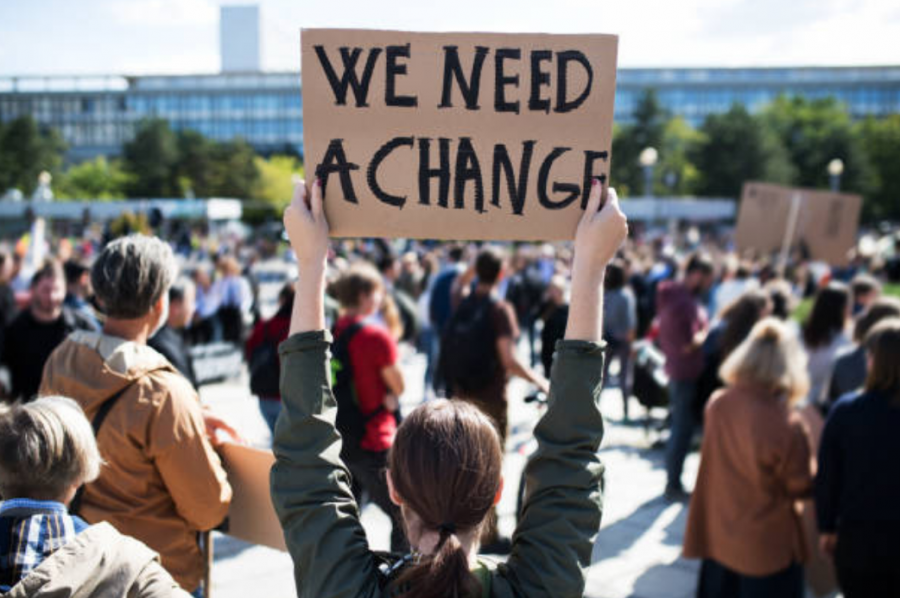-
Resources and Support, Advocacy and Campaigns, Health and Disability, Looking for work, Staying in work, Currently not in work, Organisations,Blog Views
526
The Overlooked History of the Disability Rights Movement in the United Kingdom
Patchwork Hub are committed to connecting individuals with more accessible and inclusive job opportunities. With our social mission in mind, we are part of a wider movement that looks to improve the access of disabled individuals to equal rights and opportunities. To understand both why this is so important, and how we can do better as a society, it's important to understand the history of the Disability Rights movement. This article, therefore, highlights just some of the key moments in the history of the Disability Rights movement.
What is the Disability Rights Movement?
The Disability Rights movement is a global ongoing movement that aims to achieve equal rights and opportunities for every person with a disability. Though most people know about movements such as the Suffragette movement, or the American Civil Rights movement, the Disability Rights movement is often overlooked.
Because of this, it’s vital that we all learn about the history of the Disability Rights movement. This is important for several reasons:
- Knowing about how we have fought for the rights of disabled individuals in the past can help us fight for the rights and opportunities of disabled individuals in the present and future.
- In the past, people with disabilities have often been portrayed as ‘helpless’ or ‘passive victims’. This is very much not the case. Highlighting how disabled people have fought for their rights and the rights of their community can help people understand this.
How has the Disability Rights Movement progressed?
First World War
Before the First World War, the ‘Eugenics’ movement was active. Coined by Sir Francis Galton in 1883, this phrase was used to describe ‘the science of which deals with all influences which improve the inborn qualities of a race’. In its early years, the Eugenics movement was dominated by a small elite group. This group sought to ‘scientifically’ establish ideas about inherited abilities and characteristics that were supposedly linked to race and social class. This movement looked at disabled individuals like they were a ‘problem’. Disabled people were often separated from wider society, and treated poorly as a result of their differences.
However, the First World War challenged these ideas. A large number of soldiers returned from the war with mental and physical injuries. These included loss of limbs and other bodily injuries, through to the psychiatric condition of ‘shell shock’. With thousands of men returning home from war with disabilities, this led to a small cultural shift in attitudes towards disability.
In the years to come, disabled people began to make themselves heard through marches, protests and campaigns and this became noticed in a way that had not been done before. One notable protest was the march of the National League of the Blind on Trafalgar Square in April 1920. Using the slogan ‘Justice Not Charity’, the League emphasised that they were not looking to achieve any special rights, but rather to gain the equal rights that they deserved. The Blind Persons Act (1920) which followed this was the first major set of laws that were passed, introduced and supported by disabled people.
Second World War
The Second World War was another key juncture for the Disability Rights movement. Due to the mass migration of citizens into the British Armed Forces with conscription, many jobs at home were left vacant. Because of this, individuals with disabilities who may have found it difficult to find work before the war were viewed as important members of the workforce.
Recognising the importance of these workers, in 1944 the Disabled Persons (Employment) Act was introduced, encouraging employers to ensure that at least 3% of employment roles were offered to disabled people. The introduction of this Act was therefore a very early step in decreasing the ‘disability employment gap’, the difference between the proportion of disabled and non-disabled people in employment. To this day, however, the disability employment gap is a persistent issue. According to government data, in the second quarter of 2021, the gap totalled 28.4 percentage points. Here at Patchwork Hub, we’ve made it our mission to work towards reducing the disability employment gap. With this in mind, we think it’s crucial to educate employers to be more inclusive and accommodating of individuals' accessibility needs.
In later decades, due to direct action and campaigning from Disabled People's Organisations (DPOs), more bills were passed. Perhaps the most important was the Disability Discrimination Act (1995), also known as the DDA. Receiving royal assent on 8th November 1995, the Disability Discrimination Act introduced new laws to prevent discrimination against people with disabilities. The Act made it unlawful to discriminate against disabled persons in connection with employment and training, education, the provision of goods, facilities and services, and transport. Although this was by no means a perfect piece of legislation, this Act provided a crucial platform to build on.
Vital in the establishment of the DDA were the actions of DPOs such as the Disabled People’s Direct Action Network (DAN). If you’re interested in reading more about the DDA, we have published a blog on the Disabled People’s Direct Action Network. You can also watch ‘Then Barbara Met Alan’ on BBC iPlayer or Netflix! Based on the history of Barbara Liszicki, Alan Holdsworth and DAN, this docudrama rewrites the conventional representation of disability on mainstream television.

Alan Holdsworth and Barbara Lisicki, portrayed by Arthur Hughes and Ruth Madeley in Then Barbara Met Alan.
Since then, several more acts have been passed to further equality for people with disabilities. The 2005 DDA Amendment Act for example extends the definition of disability, and the 2010 Equality Act legally protects disabled people from discrimination at work.
Are you ready to join the movement?
To this day, however, disabled people do not have access to equal rights or equal opportunity. This is often due to societal and systemic barriers that limit accessibility.
Here at Patchwork Hub, we are determined to strive for equality for all and to integrate accessibility and disability inclusion into the future of work.
By bringing you this brief overlooked history of the Disability Rights movement, we hope to spark curiosity and raise awareness for this under-appreciated history. With as many as 14.1 million disabled people in the UK and 1 billion disabled people globally, it’s vital that we continue to fight for what is right.
Did you find this article on the Disability Rights movement interesting? How will you continue to fight for equality and disability rights?
Written by Adya Manoj
Published: 20th April 2022
Tags
- accessibility int he workplace
- Disabled People’s Direct Action Network
- acting
- advocacy and campaigns
- american civil rights movement
- bbc
- blind persons act
- chronic health condition
- chronic illness
- community
- deaf
- disability
- disability discrimination act
- disability employment gap
- disability rights movement
- disability services
- disabled persons employment act
- equality act
- equality and diversity
- eugenics
- first world war
- government support
- hearing impairment
- impact
- law
- making a difference
- mental health
- national league of the blind
- neurodiversity
- psychiatric
- psychiatry
- reasonable adjustments
- resources and support
- second world war
- shell shock
- suffragette movement
- support services
- then barbara met alan
- trafalgar square
- visual impairment
- war
- world war one
- world war two
All Tags
Ability Connect Academy for Disabled Journalists Academy for Disabled SEO Specialists Access2Funding Accessibility Accessibility information Accessibility int he workplace Accessibility ramps Accessible education Accessible locations Accessible places Acid reflux Adaptive fashion Advocacy AI Aleto Foundation All Saints Alt text Aspiring Entrepreneurs with Disability Development Programme Assistive technology Autism Awareness Barriers Beth Kume-Holland Blog Budgeting Bullying BUPA Burnout Business Business Disability Forum Business model creation Business skills Business workshop Businesses Cancer Candidates Captions Cash flow Cerebral palsy Characters Charity Charity sector Chronic pain Closed captions Clothes Clothing Cognitive disabilities Comfort zone Communication Community networks Companies Company Company Corner Company culture Confidence Confucius Consultant Consultation Content creator Content designer Data talent Diagnosis Difference Digital and social media marketing Digital transformation Disabilities Disability advocate Disability advocates Disability and Neurodiversity Network Disability awareness Disability Awareness Training Disability community Disability confident Disability Confident Leader Disability employment Disability inclusion Disability news Disability Policy Centre Disability Pride Disabled Disabled candidates Disabled community Disabled founders Disabled people Disabled People’s Direct Action Network Disabled talent Disabled team Disabled-led Diverse Diverse workforce Diversity Diversity and inclusion Diversity Project Diversity Recruitment Platform Domestic violence Dysfluency ED&I EDDP Education Education and resource platform Employment opportunities Employment platform Empowerment Equality Act 2010 Ethnic minorities Eventbrite Expert teachers Expert training Fashion Fashion industry Fathom Feedback Finances Financial goals Financial planning Financial plans Financial services Financial services sector Flexible work Freelance FTSE 100 Fund management GAIN Game Gaming Gareth Walkom Garment technologist Gastrointestinal conditions Gem Turner Gender Gender Networks Grant Logan Guide dog Healthcare Hidden talent pool Homeworking Hospice UK Compassionate Employers Programme HR Hybrid working Ian MacKenzie Inclusion Inclusive culture Inclusive workforce Inclusivity India Inspiration Intellectual capabilities Interview process Interviews Investments Invisible disabilities Invisible disability Isaac Harvey Isaac Harvey MBE Istituto Marangoni Jack Wills Job descriptions Job interviews Job opportunities Job vacancies Journalism Journalists Learning disability Leeds Leeds trinity university Legislation LGBT Great LGBTQ+ Limb-pelvic hypoplasia LinkedIn LinkedIn influencer Listening service Lloyds Bank London London Fashion Week Long-term health condition Long-term health conditions Mapping days Mark Esho Matt Pierri Maya angelou Meta Metaverse Migrants Motivation Multinational firm Musculoskeletal conditions National Council for the Training of Journalists NCTJ Neurodivergence Neurodivergent Neurodiverse Neurodiversity consultant Neurodiversity space Neurotype Neurotypes New Delhi News Non-disabled founders Non-profit Novos OBS Occupational health Office environment Organisations Partially sighted Partnership Patchworkers People Phase Eight Phone calls Physical disabilities Pirate video games Policy Poverty Presentations Pride Network Primark Processes and systems Professional Women’s Network Progress Together Public speaking Puneet Singh Singhal Race Race and Ethnicity Network Raising awareness Registered blind Remote course Remote education Remote learning Remote work Removing barriers Resilience Revenue streams Rights School Scoliosis Scope Search engine optimisation Selection process Self-employed Self-employment Senior staff Sexuality Shaw trust Shaw trust power 100 list Sign language SJP Small Business Britain Social impact Social mission Social mobility Social-emotional learning Social-emotional learning platform Software Speaking situation Speech differences Speech disabilities Speech impediment Spotlight series Spotlight stories Ssstart St. James’s Place Charitable Foundation Staff Stammer Stammering Stonewall Stories Stuttering Sustainable change Sweaty Betty Target market Tech industry Tech talent TEDx Tesco Think tank Training Underrepresentation Unhidden Unhidden Clothing Universities University of Leicester Vanessa Castañeda Gill Victoria Beckham Video editor Video game Vimeo Violence Virtual reality VR Wealth management Web accessibility Wheels and Wheelchairs Women Work environment Work from home Working conditions Working Families Group Working from home Workplace adjustments Youth Zoom Abc Ability Today Access to work Accessibility in the workplace Accessibility test Accessible work Acting Adhd Adjustments Administrative Adrian lord Advice Advocacy and campaigns Allparty parliamentary group for inclusive entrepreneurship American civil rights movement Android Anglonorman App Artificial intelligence Bad grammar Barriers to work Bbc Benefits Blind persons act Blue badge Blue badge service specialists Care Career Carer Celtic languages Center on everyday lives of families Ceo Cfs Chloe tear Chronic fatigue syndrome Chronic health condition Chronic illness Commodo aute beatae Community Community story Community, community story, founder, feature, accessible work, disability employment gap, making a difference Companies house Compressed hours Computer science Computers Coronavirus Councils Covid19 Crystal mark standard Deaf Design Dialects Dictionary Digital accessibility Disability Disability discrimination act Disability employment gap Disability rights movement Disability services Disabled peoples direct action network Disabled persons employment act Disabled-led organisation Easy read Edit Tag Test 2 Email address Employer Spotlight Employers Employment English English speakers Entrepreneur Entrepreneurship Epilepsy Equality Equality act Equality and diversity Equality of access Esources, disability, disability services, support services, community story, features, adjustments, social support network Esse vero eum nisi a Eugenics Facebook Feature Features Fibromyalgia First world war Flexi Flexible working Flexitime Flextime Founder Francesco cirillo Freelancing French Gcses Gdpr General data protection regulation Good Good grammar Google Government policy Government support Graduate Graduates Grammar Grammar schools Health Health condition Health conditions Hearing impairment Help And Support Tags History History of language Holistic Ico Impact Imposter syndrome Inclusive entrepreneur network Inequalities Inequality Information commissioners office Information governance Instagram Internet Jacqueline winstanley Laborum Magna moles Language Latin Law Learning difficulties Lexicographers Limited company Local councils Local government Making a difference Marketing strategy Mecfs Medical conditions Medical model of disability Medical vs social models of disability Medicines Mental health Middle english Mindfulness Mlm Mobility issues Molestias quod sapie Multilevel marketing Nam eaque iure aut v National league of the blind Neurodiversity Nihil corporis aliqu Niya Normans Old english Old french Onboarding and retention Online Out of work Oxbridge Parent Passwords Patchwork hub Payment details Planning Planning for work Podcasts Pomodoro Preposition Private schools Psychiatric Psychiatry Punctuation Qui voluptatem debi React Reasonable adjustments Recruitment Remote working Resources Resources and support Rest Retinopathy of prematurity Sales Scam Search engine Second world war Shell shock Slang Sociability Social Cipher Social interactions Social media Social model of disability Social support network Socialising Spelling Spoken language Spotlight series Spotlight stories St. James’s Place Standard english Startup State schools Student Students Studying Suffragette movement Support Support services Syntactician Syntax Tag Technology The Disability Policy Centre The elderly Then barbara met alan Trafalgar square Turkish United nations Universal inclusion University University of arts london University of cambridge University of hertfordshire University of hull University of leeds University of oxford Victoria Jenkins Visual impairment War Ways of working West germanic dialects William shakespeare Windsor consultations WithVR Wordpress Work structure Workforce recruitment Working environment Workplace barriers World war one World war two Young carer




